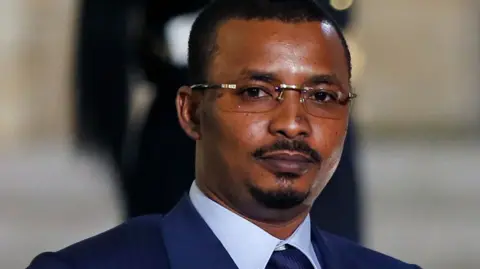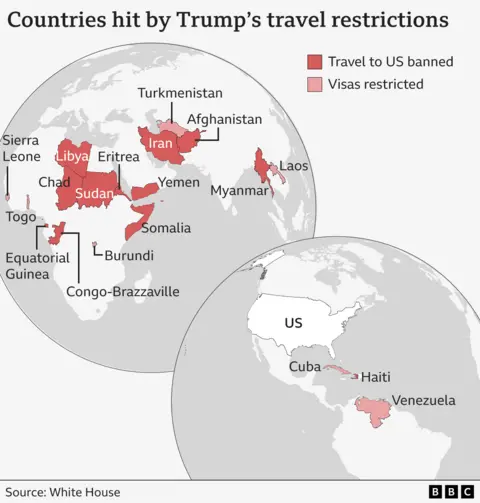Chad halts US visas in revenge for Trump travel ban
 CHESNOT / GETTY IMAGES
CHESNOT / GETTY IMAGESThe central African nation of Chad says it is suspending all visas to US citizens as a matter of "reciprocity", after learning that it is one of a dozen countries whose nationals are banned from travelling to the US.
"Chad has neither planes to offer nor billions of dollars to give, but Chad has its dignity and pride," continued President Mahamat Idriss Déby Itno in a Facebook post (in French) on Thursday.
Africa is the continent worst affected by the travel ban announced by US President Donald Trump, with seven of the 12 countries on the list.
It is set to come into effect on Monday.
The order prohibits people from Chad, Congo-Brazzaville, Equatorial Guinea, Eritrea, Libya, Somalia and Sudan - as well as Afghanistan, Myanmar, Haiti, Iran and Yemen - from entering the US.
In addition, there will be travel restrictions on nationals of Burundi, Sierra Leone, Togo, Cuba, Laos, Turkmenistan and Venezuela - they will no longer be able to travel to the US on certain visas.
"We will not allow people to enter our country who wish to do us harm," Trump said in a video posted on X.
The US president said the list could be revised if "material improvements" were made and additional countries could be added as "threats emerge around the world".
The White House said these "common-sense restrictions" would "protect Americans from dangerous foreign actors".
- Trump's travel ban: Follow live updates
- What we know about Trump's latest travel ban
- Why were these 12 countries on Trump's travel-ban list?
Somalia was quick to react to the travel ban, immediately pledging to work with the US to address any security issues.
In a statement, Somali ambassador to the US, Dahir Hassan Abdi, said his country "values its longstanding relationship" with America.
Chad did not disguise its dismay, and in addition to the president's stern words, its Foreign Minister Abdoulaye Sabre Fadoul told the AFP news agency his government was "surprised by this announcement and even more by the terrorism-related reason [which] completely disregards Chad's commitment and results in this area".
The African Union said it was "concerned about the potential negative impact" of the measures and called on the US to adopt "a more consultative approach... with the countries concerned".
BBC Tigrinya has spoken to several Eritreans who are alarmed by the ban.
"As Eritreans, we've already suffered under our regime at home and now we're facing the same hardship under Trump's immigration policies. We've endured so much pain," one man told the BBC on condition of anonymity.
Eritrea is a one-party state where President Isaias Afwerki has been in power since it won independence from Ethiopia in 1993 after a bitter 30-year struggle.
Young Eritreans are subject to compulsory military service, prompting many thousands to flee the country and seek refuge elsewhere.
Another Eritrean woman said she worried that she and her children would no longer be able to join her husband who is already living in the US.
"We've waited so long and done everything legally, but now we're left in limbo. No-one is giving us clear answers," she told the BBC.
In a video posted to his Truth Social website, Trump said the recent alleged terror attack in Boulder, Colorado "underscored the extreme dangers" posed by foreign nationals who had not been "properly vetted".
However, the suspect in that attack is an Egyptian national and Egypt is not one of the affected countries.
According to the White House explanation of the travel ban, countries such as Libya, Somalia and Sudan lack competent authorities to issue passports or civil documents and conduct "appropriate screening measures".
All three are currently embroiled in civil wars.
In addition, the White House said: "A persistent terrorist threat also emanates from Somalia's territory" and there was a "historical terrorist presence within Libya's territory".
The other African countries affected had high rates of people overstaying their visas, ranging from 15% in Togo to 70% for some types of visa for nationals of Equatorial Guinea.
The ban takes effect on 9 June, a cushion that avoids the chaos that unfolded at airports nationwide when a similar measure took effect with virtually no notice eight years ago.
Visas issued before that date will not be revoked, the order said.
There will be exemptions for dual nationals and athletes in major sporting events such as the 2026 men's football World Cup and the 2028 Summer Olympics in Los Angeles.
The travel ban fulfils a promise Trump made during his 2024 election campaign but is likely to be challenged in court.
He signed a similar order in 2017, during his first term in office.
It featured some of the same countries as his latest order, including Libya, Somalia and Iran.
Critics called that a "Muslim ban" as the seven countries initially listed were Muslim majority.
The White House revised the policy, ultimately adding two non-Muslim majority countries, North Korea and Venezuela.
This was upheld by the Supreme Court in 2018.
President Joe Biden, who succeeded Trump, repealed the ban in 2021, calling it "a stain on our national conscience".
Additional reporting by Will Ross

You may also be interested in:
 Getty Images/BBC
Getty Images/BBCGo to BBCAfrica.com for more news from the African continent.
Follow us on Twitter @BBCAfrica, on Facebook at BBC Africa or on Instagram at bbcafrica
